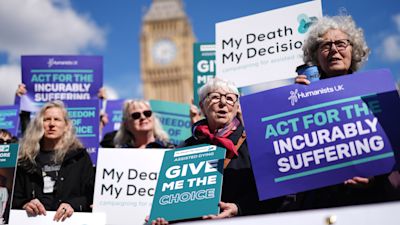Belgium's 'slippery slope' for assisted dying laws could provide example for UK

Over the past 20 years about a dozen countries around the world have adopted Assisted Dying, or euthanasia, providing some valuable lessons for MPs in England and Wales, ITV News' Europe Editor James Mates reports
The debate on assisted dying in Belgium is more than 20 years ahead of the UK, so much so that even doctor-assisted suicide is far from unknown.
Since euthanasia, as they refer to it, was introduced in 2002, it has also been extended to cover under-18s in exceptional circumstances, with terminal illness and their parents’ consent.
The Belgian example looks like a classic ‘slippery slope’ a well-intentioned law being stretched and expanded way beyond the intentions of the original framers.
Many Belgians accept that is what has happened, but by and large, they are happy that things have worked out this way.
Indeed a mainstream opposition party, Open VLD, are pushing for legislation to make the law even more flexible, especially for those suffering from dementia. “We start from the liberal principle that you decide for yourself about your life,” they say.
Currently, a patient can elect to die with a doctor's help if they are terminally ill, in sustained and long-lasting pain, or suffering from multiple debilities of extreme old age. Last year more than 3,400 people chose this route, more than any country in Europe except the Netherlands.
It is the ‘long-term pain condition’ that has proved most controversial because it also covers those suffering from extreme mental pain - such as chronic depression – even if the patient is physically healthy.
We spent an evening with Dirk and Karin Vervaet whose daughter Elien died by euthanasia last year. She was only 24.
For six years she suffered crippling depression, the last three years of which she spent in the care of doctors and psychiatrists, convincing them that her pain was unbearable and her desire to die irreversible.
Dirk and Karin came to accept their daughter's wishes and were with her in the room when she died. “To be honest euthanasia was a much better option than she go under a train or something”, Karin told me.
They both agreed that for her the happiest moment of that entire six years was when she woke up on the day of her appointment and headed to the clinic for a final time.
“As a parent we could have asked her to keep living to make us happy, but us being happy wouldn’t have made her happy” said her father. “At one point I had said to Elien “If I had two medicines, one of which could make you better and the other make you die, which one would you choose? And she said the one that would kill her”.
Whatever one’s view of this heartbreaking story, it goes way beyond anything envisaged in the Assisted Dying Bill currently before Parliament.
That strictly limits its use to those who are terminally ill with less than six months to live. But if the Bill eventually becomes law, could such limits ever hold?
Brussels lawyer Fernand Keuleneer is fearful that British MPs don’t understand the way that overarching fundamental rights that can expand the scope of any law, however tightly written, once it comes to be interpreted in the courts.
He points out, as an example, the right not to be discriminated against. “Why would it be legal for someone to be allowed to end their life for the unbearable pain of a physical illness, but not for a mental one. You must be aware that if you want one you will get the other. Inevitably," he says.
Originally, explains Keuleneer, the legislation simply decriminalised medical euthanasia, but that quickly became a right to euthanasia. “It developed very fast from being a last resort to the first question," he says.
"I know elderly people who, on only about their third day in hospital, have been asked ‘did you already think about the possibility of euthanasia?’ and they found that very upsetting”.
Those who worry that pressure on health budgets and hospital beds, pressure from families, or simply embarrassment at being a burden may be pushing people into choosing to die, are a minority in Belgium. The public mood here is firmly that the relief of suffering outweighs other considerations.
But the lesson from the Belgian experience is that once the taboo has been broken the scope and extent of assisted dying will, over time, inevitably expand. And whether or not one thinks that would be a good thing, one should be aware of that before taking the first step.
Have you heard our podcast Talking Politics? Tom, Robert and Anushka dig into the biggest issues dominating the political agenda in every episode